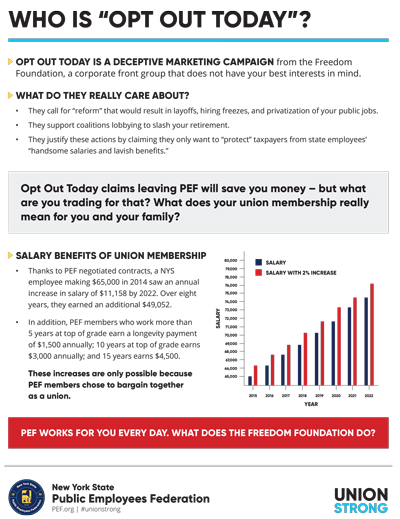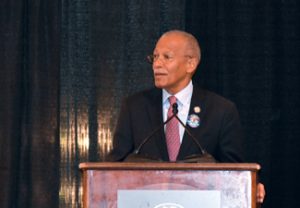
 December 21, 2022 — The PEF Executive Board met December 14 and 15 in Albany and welcomed a renowned international expert on technology and its impacts on public-sector workers, heard a panel discussion on the Fund Our Future campaign, and discussed the latest organized attempts to reduce union membership.
December 21, 2022 — The PEF Executive Board met December 14 and 15 in Albany and welcomed a renowned international expert on technology and its impacts on public-sector workers, heard a panel discussion on the Fund Our Future campaign, and discussed the latest organized attempts to reduce union membership.
An attack on unions
PEF’s membership has risen to 49,000, said President Wayne Spence, thanks to the State’s lifting of the hiring freeze and PEF’s success signing up new members. That’s impressive considering a concerted effort by the Freedom Foundation to convince union members to drop out of their union.
“Many of us have gotten some unwanted emails in our state email,” said Organizing Director Dan Carpenter. “A group calling themselves ‘Opt Out Today’ – heavily funded by the Freedom Foundation — is hitting back and they are hitting back hard. They have invested $20 million in New York.”

The organization had been targeting CSEA with messaging, but waited until after the election cycle to pounce on PEF.
“It’s not coincidental they targeted PEF this time around,” Spence said. “We’re now making strides. We are now affecting national issues. AFT and SEIU are highlighting the things we are doing. If we weren’t doing anything significant, there would be no reason to target us.”
Carpenter said Opt Out Today claims in a blog post that thousands of PEF members have expressed their desire to drop out.
“Let me set the record straight,” he said. “We’ve had six. Six official drops.”
PEF is fighting back with information that reveals the true value of being a member of the union. This document outlines some of the benefits. Of particular note – a PEF member with a salary of $65,000 in 2014 has seen their salary jump more than $11,000 in eight years. Over those eight years, that PEF member earned more than $49,000, thanks to negotiated contractual raises and the effects of compounding.
“The reality of what they are doing now is they want to take away our ability to negotiate that salary increase, take away our ability to negotiate the cost of health care,” Carpenter said. “They want to take away our workplace protections and, most importantly, they want to take our pensions away.
“When these attacks come, we do need to be vigilant,” he continued. “We are doing great work here at PEF and it needs to continue.”
Dangers of technology in the workplace
President Spence invited Dr. Christina Colclough, an expert on the intersection of the workplace and growing technology trends, to address the board on what is coming and what to do about it.
Colclough is a long-time trade unionist based in Europe who has worked all over the world supporting unions as they navigate digitization.
“There is a lot of talk around AI,” Colclough said via Zoom. “We all seem to assume that management understands the technology they are using. If there is one thing that is very clear – they don’t. We need to hold them accountable, and we need to have union strategies for that.”
She said unions urgently need to lead the way on reshaping the current model of digitization and must become stewards of good data governance.
“We must demand and live up to the principles of transparency and inclusion,” she said. “As unions, what we have always done is fight to improve the conditions of workers. So we should fight to improve digitization.”
Colclough emphasized the need for information.
“We don’t know what we don’t know,” she said. “If any of you have spent time with developers, they speak a different language. We will never be able to reshape and come up with new suggestions if we don’t know if the technology can really do what they promise.”
A lot of harm can come from digitization technology. Just look at the COMPAS (Correctional Offender Management Profiling for Alternative Sanctions) program being used by parole in New York. It has been shown that the algorithm is biased.
“No one can predict the future,” Colclough said. “When did we accept that anybody could predict the future? Now we have AI they claim can predict when someone is likely to commit a crime or whether somebody is likely to commit tax fraud.”
She said there is even AI that can write a student’s thesis and a professor would never know the difference.
RELATED: Keep an eye on your public sector job: Staying ahead of AI and tech trends
What the digitization of public services boils down to, she said, is de facto privatization of public services through the procurement process. The charge against it must be led by unions.
“What can we do about this?” she asked. “We need negotiators who understand digital strategies. We need a seat at the table. We need much stronger data rights. We need to transform our unions.”
President Spence said PEF is going to be working alongside AFT and PSI on digitization strategies.
“We need to speak with one voice,” he said.
Health and safety at state office
President Spence reported on the health and safety issues at 55 Hanson Place in Brooklyn, where multiple state agencies and legislators have offices. He said there is disorganization among management and a lack of transparency.
“It got to a boiling point when we found a member had been hospitalized and there was a rumor it was legionella pneumonia,” he said.
The union learned that there had been trace amounts of legionella bacteria in the building’s cooling towers back in the summer, and while it was not legally required to be disclosed, it could have been.
“Even if it’s not worthy of reporting it, if you’re sick and not well, you could be susceptible,” he said. When confronted about the issue, Spence said the State Education Department responded callously.
The Attorney General, who also has an office in the building, and the governor, apologized.
“OER (The Office of Employee Relations) went on the offensive,” he said. “I called the AG and asked if she knew. She said no and asked why she was hearing it from PEF and not the state. I got a call from the governor’s people and from elected leaders. They wanted to apologize. What took place, according to the governor’s folks, will never happen again.
RELATED: Members come together to demand action on health and safety issues at Brooklyn state office
Union finances
PEF Secretary-Treasurer Joe Donahue presented his report on the union’s unaudited financial statements from July 1 to September 30.
“There was a lot of market volatility,” he said. “For this quarter we lost almost $400,000 in investments.”
There were also some lines over budget, such as employee benefits, occupancy and parking, office supplies, and insurance. At this time, he said he wasn’t asking for any budget amendments, hoping the numbers would even out.
Membership counts were up.
“Thanks to our leaders and the organizing department, our numbers are up,” he said. “As of September 20, we have more than 49,000 dues-paying members. Hopefully we are on the way back to our previous numbers.”
There are some obstacles to signing up new members, such as the state hiring temporary and seasonal workers over permanent positions.
Joining together to Fund Our Future

The Executive Board also heard from a panel of community leaders and legislators who are joining forces with PEF in its Fund Our Future coalition.
Rev. Peter Cook, executive director of the New York State Council of Churches; Ron Deutsch, a private consultant on social economic justice issues; Ryan Delgado, chief of staff at the New York State AFL-CIO; and New York State Sen. Robert Jackson spoke on the importance of legislative advocacy and supporting one another.
PEF is asking for support of a number of legislative budget proposals, including reinvigorating the state Civil Service system; a $45 million budget add for OPWDD to stop current closures and develop a plan to address ongoing housing shortages; $50 million for OMH/OASAS to address the ongoing mental health/addiction crisis; and to amend the “Less is More” law and “HALT” act and provide real re-entry services and support for the formerly incarcerated.
The first Executive Board meeting of 2023 will be held March 23 and 24 in Syracuse.
RELATED: LINK TO THE FOF PANEL STORY

